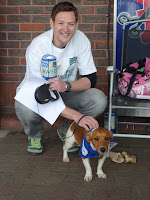 What other job means you get to watch several castrations, meet a cat with thumbs and eat cake all in the same morning...well, mine.
What other job means you get to watch several castrations, meet a cat with thumbs and eat cake all in the same morning...well, mine.It’s sunrise, or maybe just after. I arrive in a car park next to an RSPCA branch in Brighton East Sussex. My breath comes out in vapour despite winter finally giving way to spring.
The air is punctuated with plaintive cries from the felines within...these clever cats know something is going on...they just don’t know what.
I introduce myself nervously. She looks me up and down – from my crumpled RSPCA polo shirt to my pale face - and says: “I do hope you aren’t too squeamish. We’ve had three people faint on this bus I don’t want you to be the fourth.”
This is Nicky Honey, the RSPCA’s one-woman cat neutering dynamo!
For the last 11 years her mobile clinic has become a familiar sight in car parks, outside supermarkets, pubs and community halls in south-east England. The mobile clinic provides low cost cat neutering operations to pet owners in the region's communities who are on low incomes and benefits.
 |
| Inside the mobile neutering van |
Alongside her partner in crime (vet Alan), Nicky works anything up to 60 hour weeks because she is so passionate about the value of neutering – which is not only important to protect cats' health, but also in reducing the numbers of unwanted kittens.
 |
| A cat with thumbs! |
Nicky tells me that one cat was brought in to be neutered after apparently having had 17 litters- which equates to around 150 kittens born to owners that did not want them and left to animal charities such as RSPCA and Cats Protection to pick up the pieces.
But the mobile clinic goes far beyond simple neutering. Nicky says sadly that one cat was brought in for neutering which was actually in labour, and the owner hadn’t realised. Nicky and the vet managed to save three of the kittens after doing an emergency caesarean.
Often the cats have other health problems when they are examined by the vet. One was brought in with a ruptured diaphragm and ear problems, mouth abscesses, fractures and gynaecological problems are all too common.
Nicky says the nature of the job involves many skills from nursing to plumbing. It can be quite intense and she has learned to expect the unexpected.
Today there are 14 cats; nine female and seven male. Apparently the procedure is more complicated for the gals than the guys.
I see a female spay first. Now please bear in mind that I am a bit on the softy side when it comes to animals – I was once almost hit by a car rushing to the centre of a duel carriage way to rescue a pigeon (it died in my arms)...
That rather emotional response to animals – and my dislike of blood –is why I highly suspected that I might just keel over at the first sight of blood.
However - all's well that ends well - I didn’t faint... and I got to meet a cat that had thumbs! Now that’s not the sort of thing you get to do every day. Afterwards, as reward for all my hard work (ie: not passing out), Nicky gave me a slice of cake. Nice.
Nicky Honey is an amazing woman, who really does dedicate her life to animals. I feel very privaliged to have spent the day seeing her work, and to have the opportunity to learn why neutering plays such an important part in the on-going fight to improve animal welfare.
By Calie Rydings, snr RSPCA press officer











